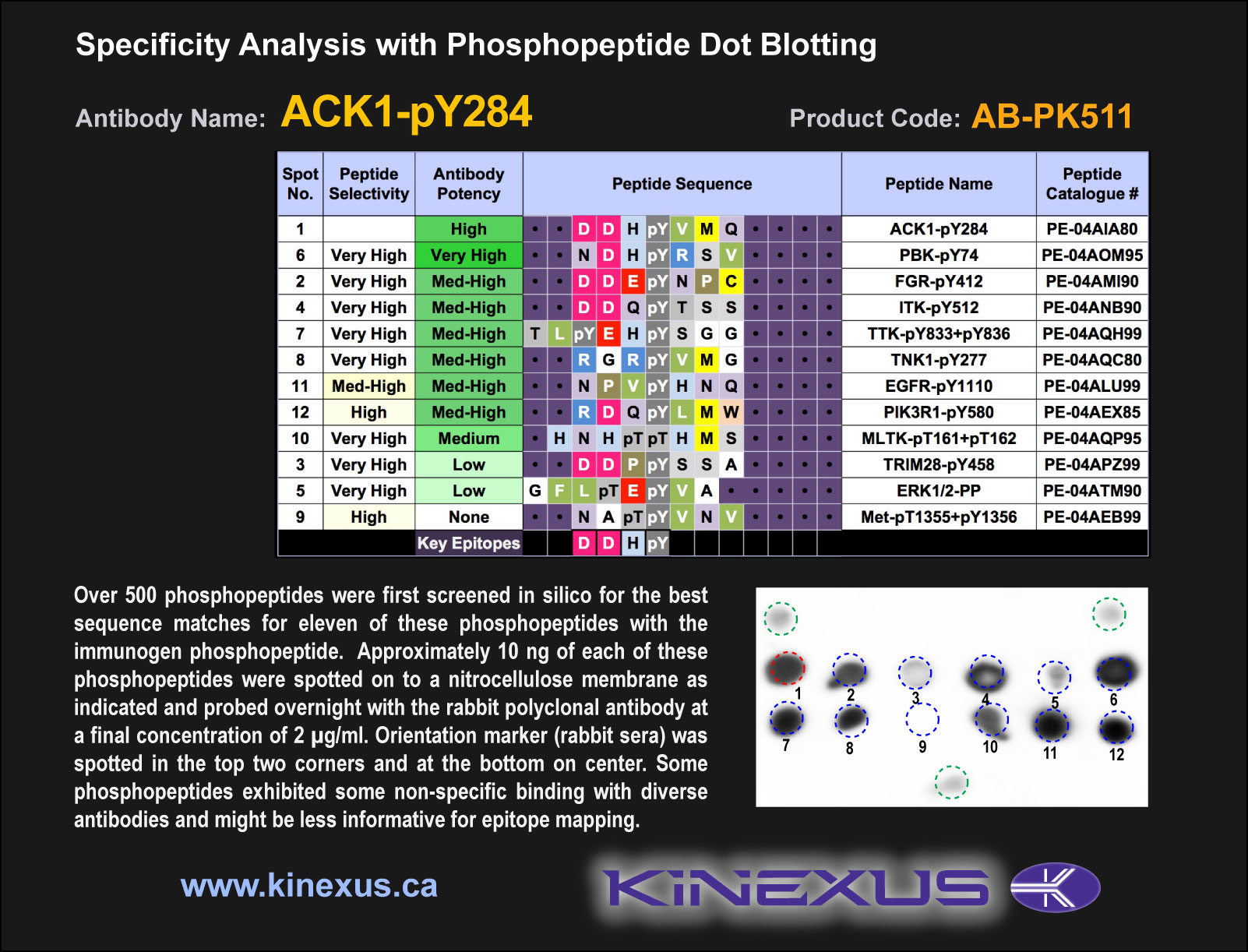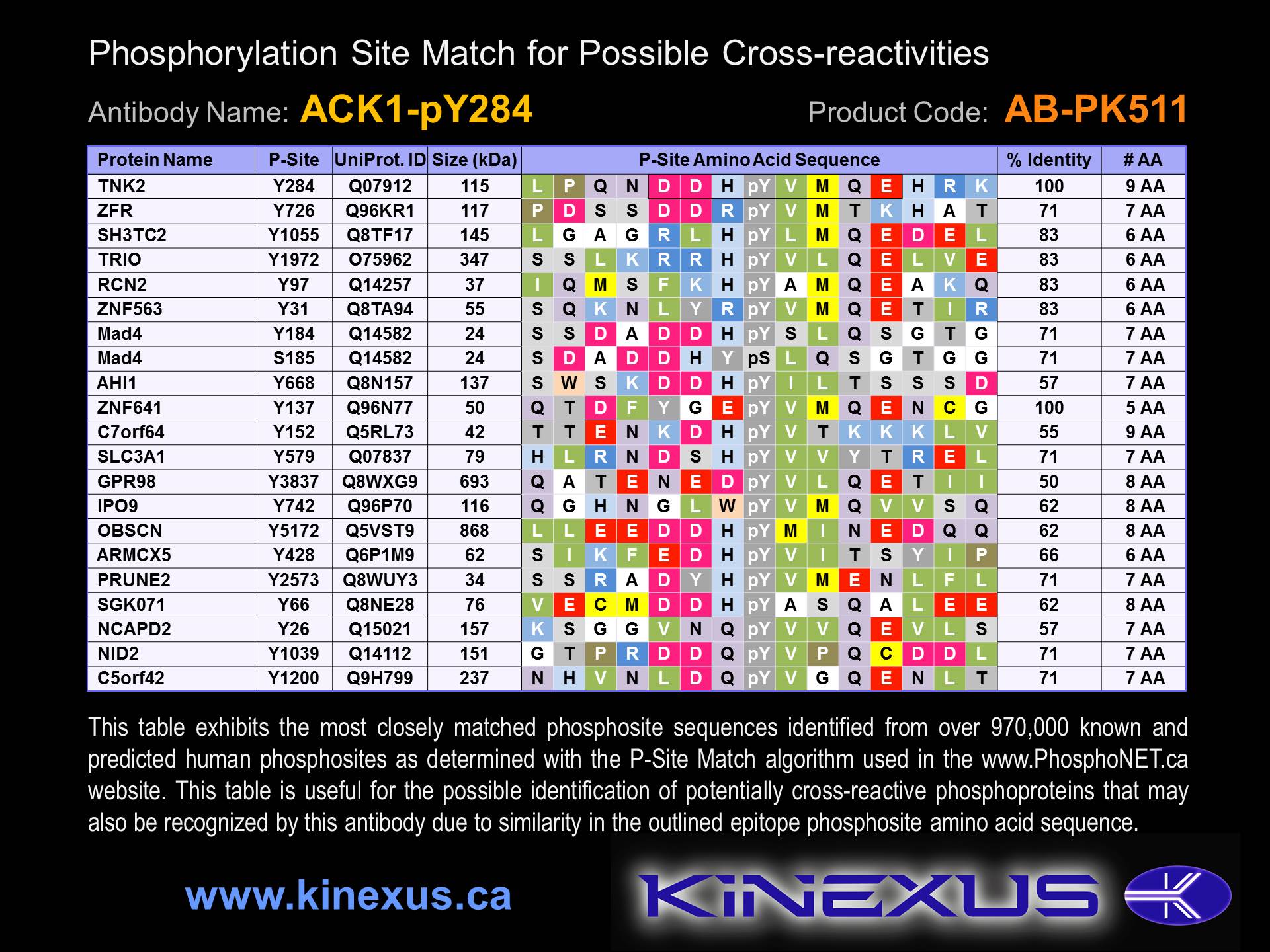Product Name: ACK1-pY284
Product Number: AB-PK511
| Size: | 25 µg | Price: | 89.00 | |
| $US |
Target Full Name: Activated CDC42 kinase 1
Target Alias: ACK; Activated Cdc42-associated kinase 1; Activated p21cdc42Hs kinase; Activated p21cdc42Hs kinase 1; Kinase ACK1; Non-receptor protein tyrosine kinase Ack; p21cdc42Hs; TNK2; Tyrosine kinase, non-receptor, 2; FLJ44758; FLJ45547; ENSG00000061938
Product Type Specific: Protein kinase phosphosite-specific antibody
Antibody Code: PK511
Antibody Target Type: Phosphosite-specific
Antibody Phosphosite: Y284
Protein UniProt: Q07912
Protein SigNET: Q07912
Antibody Type: Polyclonal
Target Alias: ACK; Activated Cdc42-associated kinase 1; Activated p21cdc42Hs kinase; Activated p21cdc42Hs kinase 1; Kinase ACK1; Non-receptor protein tyrosine kinase Ack; p21cdc42Hs; TNK2; Tyrosine kinase, non-receptor, 2; FLJ44758; FLJ45547; ENSG00000061938
Product Type Specific: Protein kinase phosphosite-specific antibody
Antibody Code: PK511
Antibody Target Type: Phosphosite-specific
Antibody Phosphosite: Y284
Protein UniProt: Q07912
Protein SigNET: Q07912
Antibody Type: Polyclonal
Antibody Host Species: Rabbit
Antibody Immunogen Source: Human ACK1 (TNK2) sequence peptide Cat. No.: PE-04AIA80
Antibody Immunogen Sequence: DDH(pY)VMQ(bA)C
Antibody Immunogen Description: Corresponds to amino acid residues D281 to Q287; In protein kinase catalytic domain activation T-loop between subdomains VII and VIII.
Antibody Immunogen Source: Human ACK1 (TNK2) sequence peptide Cat. No.: PE-04AIA80
Antibody Immunogen Sequence: DDH(pY)VMQ(bA)C
Antibody Immunogen Description: Corresponds to amino acid residues D281 to Q287; In protein kinase catalytic domain activation T-loop between subdomains VII and VIII.
Production Method: The immunizing peptide was produced by solid phase synthesis on a multipep peptide synthesizer and purified by reverse-phase hplc chromatography. Purity was assessed by analytical hplc and the amino acid sequence confirmed by mass spectrometry analysis. This peptide was coupled to KLH prior to immunization into rabbits. New Zealand White rabbits were subcutaneously injected with KLH-coupled immunizing peptide every 4 weeks for 4 months. The sera from these animals was applied onto an agarose column to which the immunogen peptide was thio-linked. Antibody was eluted from the column with 0.1 M glycine, pH 2.5. Subsequently, the antibody solution was neutralized to pH 7.0 with saturated Tris.This antibody was also subject to negative purification over phosphotyrosine-agarose.
Antibody Modification: Unconjugated. Contact KInexus if you are interest in having the antibody biotinylated or coupled with fluorescent dyes.
Antibody Modification: Unconjugated. Contact KInexus if you are interest in having the antibody biotinylated or coupled with fluorescent dyes.
Antibody Concentration: 1 mg/ml
Storage Buffer: Phosphate buffered saline pH 7.4, 0.05% Thimerasol
Storage Conditions: For long term storage, keep frozen at -40°C or lower. Stock solution can be kept at +4°C for more than 3 months. Avoid repeated freeze-thaw cycles.
Product Use: Western blotting | Antibody microarray
Antibody Dilution Recommended: 2 µg/ml for immunoblotting
Antibody Potency: Very weak immunoreactivity of a target-sized protein by Western blotting in FBS-treated A431 cells. Very strong immunoreactivity with immunogen peptide on dot blots.
Antibody Species Reactivity: Human
Storage Buffer: Phosphate buffered saline pH 7.4, 0.05% Thimerasol
Storage Conditions: For long term storage, keep frozen at -40°C or lower. Stock solution can be kept at +4°C for more than 3 months. Avoid repeated freeze-thaw cycles.
Product Use: Western blotting | Antibody microarray
Antibody Dilution Recommended: 2 µg/ml for immunoblotting
Antibody Potency: Very weak immunoreactivity of a target-sized protein by Western blotting in FBS-treated A431 cells. Very strong immunoreactivity with immunogen peptide on dot blots.
Antibody Species Reactivity: Human
Antibody Positive Control: The observed molecular mass of the processed target protein on SDS-PAGE gels is reported to be around 120-130 kDa.
Antibody Specificity: High
Antibody Cross Reactivity: Cross-reactivity with CDK1 and ERK1 in seastar oocytes, and with a 27 kDa protein in A431 and HEK-293 cells.
Related Product 1: ACK1-pY284 blocking peptide
Related Product 2: ACK1-pY518 phosphosite-specific antibody (Cat. No.: AB-PK512)
Related Product 3: ACK1-pY859+pY860 phosphosite-specific antibody (Cat. No.: AB-PK513)
Related Product 4: AckSubtide - Ack1 (TNK2) protein kinase substrate peptide
Antibody Specificity: High
Antibody Cross Reactivity: Cross-reactivity with CDK1 and ERK1 in seastar oocytes, and with a 27 kDa protein in A431 and HEK-293 cells.
Related Product 1: ACK1-pY284 blocking peptide
Related Product 2: ACK1-pY518 phosphosite-specific antibody (Cat. No.: AB-PK512)
Related Product 3: ACK1-pY859+pY860 phosphosite-specific antibody (Cat. No.: AB-PK513)
Related Product 4: AckSubtide - Ack1 (TNK2) protein kinase substrate peptide
Scientific Background: ACK1 (TNK2) is a protein-tyrosine kinase of the TK group and Ack family. It appears to be a tumour suppressor protein (TSP). Cancer-related mutations in ACK1 in human tumours point to a loss of function of the protein kinase. The active form of the protein kinase normally acts to inhibit tumour cell proliferation. It is implicated in numerous roles, including: cell spreading and migration, cell survival, cell growth, and proliferation. TNK2 is known to phosphorylate: Akt1, AR, MCF2, WASL and WWOX. In this capacity TNK2 negatively regulates the tumour suppressor, WWOX, whilst activating the oncoproteins, Akt1 and AR. Mutations in this gene have been observed in ovarian, skin, and stomach tumours. Phosphorylation at Y284 in ACK1 increases its phosphotransferase activity. Its SH3 domain appears to play an autoinhibitory role.
Figure 1. Epitope mapping of ACK1-pY284 antibody with similar phosphopeptides on dot blots.
Figure 2. Identification of phosphosites related to ACK1-pY284.
© Kinexus Bioinformatics Corporation 2017



